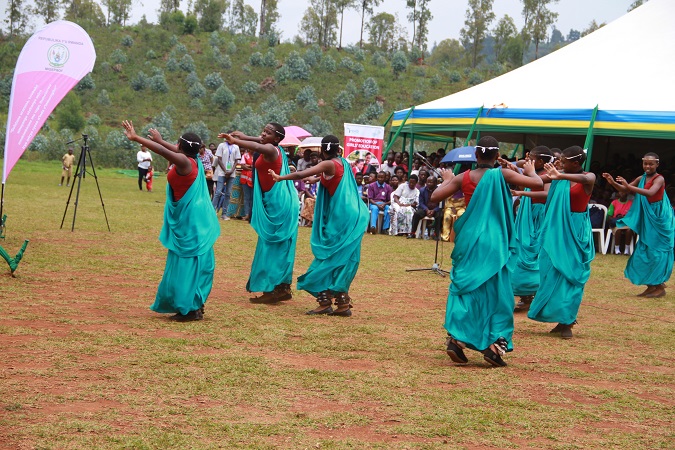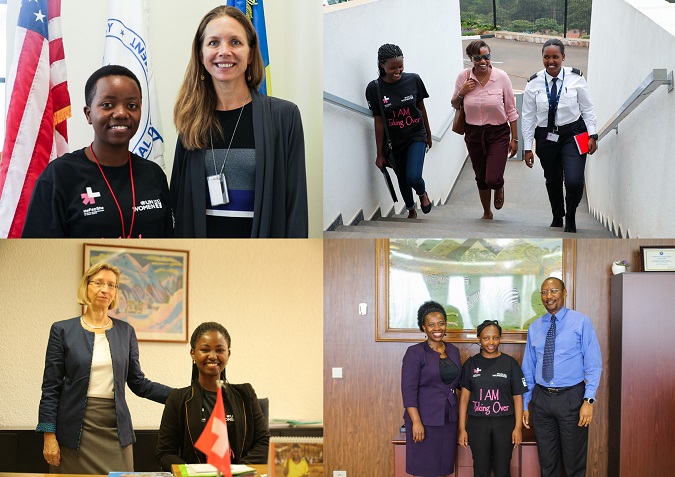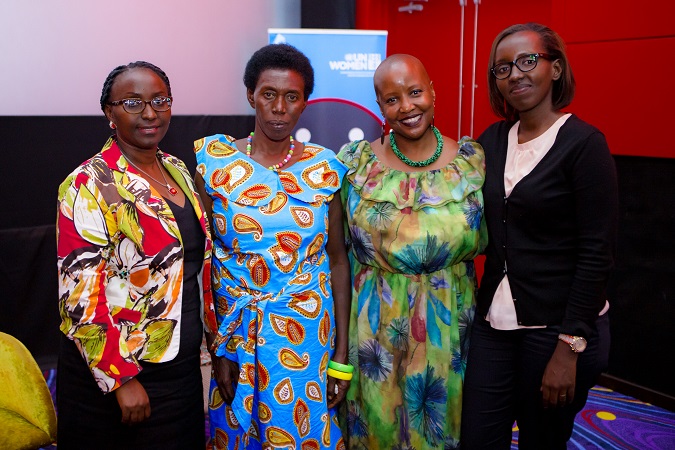Celebrating the International Women`s Month in Rwanda
Date:

“Think Equal, Build Smart, Innovate for Change” the theme of this year’s International Women’s Day calls for creative action and more innovative approaches to address gender disparities. In Rwanda, the month of March is an occasion to celebrate women, take stock of gender equality achievements, and raise awareness on the remaining gender issues through engaging wide and various audiences.
The Women’s Month kicked off with the National Celebrations of the International Women’s Day held in Nyamasheke district, in the Western Province, and was graced by the presence of H.E. The First Lady of Rwanda, and key partners working on gender equality in the country. In addition, the celebrations saw UN Women’s contribution to offer livelihood support to vulnerable families in the district.
On the 18th of March, UN Women Rwanda co-hosted the “Ring the Bell for Gender Equality event” along with 70 stock exchanges around the world that joined for the 5th edition the UN Global Compact, UN Women, Sustainable Stock Exchanges Initiative, the IFC, World Federation of Exchanges, and Women in ETFs. The event aimed at raising awareness about the critical role businesses and markets can and must play in closing the gender inequality gap, a message echoed during the Annual Ishyaka Gala Dinner that took place on the 22nd of March, where participants urged for more women in leadership positions and Boards while awarding champions in that area.
“We need to put aside our egos in order to think equal, build smart and innovate for change together”, emphasized the Chairman of the Rwanda Stock Exchange as he was ushering the audience in the symbolic ringing of the stock exchange bells.

Derived from the Youth Forums hosted at the annual CSW, and recommendations from the UN Women Youth Strategy, the commitments to give young women a platform to amplify their voice, and play an inclusive role in the development of societies, led UN Women Rwanda to launch its first “Girls Take Over” Initiative, a job shadowing experience offered to a diverse cohort of 25 young women. For half a day, on the 20th of March, these young women were allowed to take over Embassies, UN Agencies, leading companies such as the national carrier, Rwandair, and the newly opened car assembling plant of Volkswagen, banks and the first female neurosurgeon of the country. As they were shadowing leaders they had been looking up to, in the sector they want to work in, these young women were empowered to pursue their dreams and were reassured that these dreams are valid and can be realized.
“The young woman I mentored dreams of becoming a surgeon. It is a great dream and as a female neurosurgeon, I made sure she knows that it is possible. The path ahead of her is not easy, but is possible if we work together,” said Dr. Claire Karekezi, the first Rwandan female neurosurgeon, about her mentee Blandine Ineza, a recent secondary school graduate.
During the day, the young women learned, enquired, and participated in the daily activities of their host institutions. . The experience was an occasion for the hosts to share and receive useful insights and perspectives on their work, and was concluded by a debriefing session that had both the mentors and mentees express the impact that this experience left on them. The positive outcome of the initiative pledged for the strengthening of mentorship and career guidance to young women as a key avenue to bridging gender economic gaps that remain the widest today.
Stated by the UN Resident Coordinator, “If we’re really serious about development, we have to put more power in the hands of young people, mainly girls, because of their creativity, their passion, their commitment, but also because the future is their future. The agenda 2030 is envisioned for them, to make sure they push the boundaries of development and secure that hope is for everyone.”

To challenge gender stereotypes and fight discrimination through the enchanting scope of cinema, UN Women leveraged the powerful platform of the 5th edition of the Mashariki African Film Festival held under the theme “Cinema to enlighten Humanity” to convene actors filmmakers from across Africa, as well as policy-makers and development partners for a screening of the award winning documentary “The Uncondemned” - a riveting narration of the journey of Rwandan women that fought to ensure rape is recognized as a war weapon, through the support of young international lawyers and activists.
The screening was followed by a panel discussion that unpacked key elements pertaining to gender-based violence and further raise awareness on its underlying causes and ways to address it. Among the panelists was Victoire Mukambanda, one of the women who spoke up and denounced rape, enabling its legal recognition as a war crime. The documentary narrates the long quest to justice of her and other women victims of rape during the 1994 Genocide against the Tutsi. Through the partnership with the Mashariki African Film Festival and the Government of the Netherlands, the screening created yet another platform for issues of sexual violence to be given more visibility as the participants reiterated the need for more such platforms to be created to achieve the elimination of all forms of violence against women and girls, through mindset changes, education and more effective policy making and interventions.